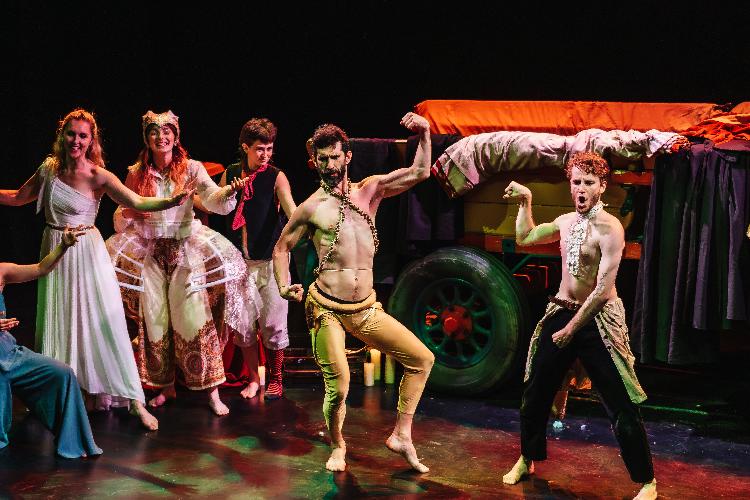After being told they cannot marry, young lovers Hermia and Lysander flee through the forest in pursuit of a new life together; in pursuit are Demetrius (Hermia's approved suitor) and Helena, Demetrius' ex who is still desperately in love with him. In the forest, we meet Titania, the Fairy Queen, her husband Oberon, and his jester Robin Goodfellow (better known as Puck) as well as a troupe of actors, the Mechanicals, rehearsing for their upcoming performance. Oberon and Puck use their magic and some enchanted flowers to meddle with the affections of the young lovers and Titania, with the ensuing chaos of only the very best Shakespearean comedies.
This production begins as soon as the auditorium doors open, with performers running riot throughout the audience as they prepare to begin the performance - we feel as if we have stumbled upon the Mechanicals' very own camp, and it is an absolutely exceptional opening to this play. Unfortunately, it is also the best part of this play.
It is unclear if all the performers (and certainly the director) have comprehended the meaning and nuances within Shakespeare's text, as much of it seems to be lacking sharpness throughout. Most characters feel overacted and without any substance. This is not to say the production is not entertaining; Lennie Longworth in particular brings delightful charm and whimsy as Robin Goodfellow, but we lack any real sense of character consistency (a challenge not limited to Puck). Characters generally lack depth or progression, and it seems that not everyone understands exactly what it is they're saying (that is, if they can be heard as they turn upstage without microphones or clamour to speak over the ambient soundscapes, however impressive) - this plot shouldn't be a particularly complicated one to follow, and yet even as a viewer with prior knowledge it was difficult to grasp at times. However, it is widely accepted that the heart of this play is in its Bottom, and Simon Gleave's Bottom is excellent, if a little self-indulgent at times.
It is indulgence in general here that spoils what has the makings of a fantastic production: it is needlessly long (no one deserves to sit through the entirety of the Pyramus and Thisbe performance unless we are wheezing at every single moment, which we were decidedly not) and incredibly slow, littered with slapstick gags that are occasionally genuinely funny but even then often overdone to the point of exhaustion.
That being said, our Lysander and Demetrius (Elliot Pritchard and Nadav Burstein) steal our hearts and the show in their hilarious and deeply-understood portrayals of the two besotted young men. Burnstein, to boot, has us in stitches as Flute.
In fact, the Mechanicals are a highlight of this production and prove the talent that lies within the entire cast and creatives. An utter visual feast, from their grotesque masks evoking traditional Greek theatre (enhanced by their perfectly exaggerated physical performances) to Rachel Shipp's lighting that casts fabulous and mesmerising shadows, we are delighted whenever the troupe appear on stage. Paulina Krzeczkowska's Peter Quince provides the perfect severe contrast to the rest of the playful group, eventually releasing his inner "main character" thespian, and Reanne Black's Snug is nothing short of adorable.
An unquestionably brilliant atmosphere, but lacking in its substance, Flabbergast Theatre's A Midsummer Night's Dream runs at Wilton's Music Hall until 20th April.
Review: Penny Lane

